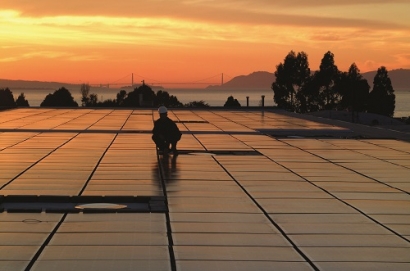
Cutting nuclear and coal and replacing those energy losses with natural gas via the Nord Stream 2 pipeline from Russia, coupled with increased solar and wind, could allow Germany to grow renewables while removing nuclear from its portfolio.
However the Danish government has created obstacles to the pipeline reaching Germany due to its proximity to the island of Bornholm. Poland and the Ukraine are also opposing the pipeline project.
Another one of Germany's goals is to increase its share of renewables in the country’s electricity consumption to 65 percent by 2030. The catch here is transmission. Most of Germany's wind power comes from the north of Germany, while the large consumers are in the south and west. Power transmission line projects are in the works, however, some are being held up by public opposition.
When up against public or political opposition, it is critical to identify the renewable supporters for each project - and have these supporters become "an army of renewable voices" to influence public opinion, and help guide projects to success.
Some tactics include:
Get to the Stakeholders
Stakeholders go beyond landowners. While gaining the support of the landowners and immediate neighbors for a new renewable project is essential, stakeholders can include a variety of people and groups, such as former elected officials, business organizations, neighborhood groups, civic and nonprofit groups and provincial stakeholders. Start by reaching out to these groups to set up presentations to members or meetings with leadership. There are many ways stakeholders can help amplify messaging through newsletters, email blasts, social media engagement, events and more.
Go Digital
Effective use of digital is an important tactic to build grassroots support among members of the community and public officials. The most important piece to any digital campaign is an effective website that regularly updates residents, dispels new myths and disseminates the latest information. To get your project’s message across effectively, website content should be clear and well-organized. This website should also link resources to educate viewers from third party sources and provide downloadable petitions, fact sheets, advocacy guides, infographics and more. Encourage people to sign up in support of the project to gather a supporter database. Give citizens factual information on your development project to campaign most effectively.
Take Advantage of Social Media
Renewable developers wishing to reach local residents with facts would be remiss not to include a social media campaign. Opening dedicated social media accounts for the project creates a defined target audience to reach with regular posts. Paid advertising is cost-effective on social media platforms, and it helps build your audience and promote both awareness of the project and resources that help the community learn more. Producing video content to share on social media network feeds (either organically or paid) is a dominant tactic to grab your audience’s attention.
Facebook has been putting a significant emphasis on video content. Around 500 million people watch Facebook videos daily. There are 27 million Facebook users in Germany. Producing a one-minute video to allow your audience to obtain key ideas about your project or ways to get involved can be extremely effective in building support among members of the community and public officials. Twitter is also a great social media network platform to share video content, with 82 percent of users watching videos. Producing a 30-second to one-minute video on Twitter is an effective way to engage your audience and build knowledge, support, and awareness for your project.
Any organic content posted should be boosted as needed by social media marketing. These ads will even help drive website traffic to continuously reach new segments of the population with your convenient resources and myth-dispelling materials.
Communication is often the key to gaining approval on any renewable project, and often it is the difference-maker between project approval and defeat.
Al Maiorino started Public Strategy Group, Inc. in 1995. His firm has developed and managed multiple corporate public affairs campaigns in a variety of industries such as gaming, cable television, retail development, auto racing, energy and residential projects. Additionally, his firm has worked on projects in twenty-six states and three countries.

